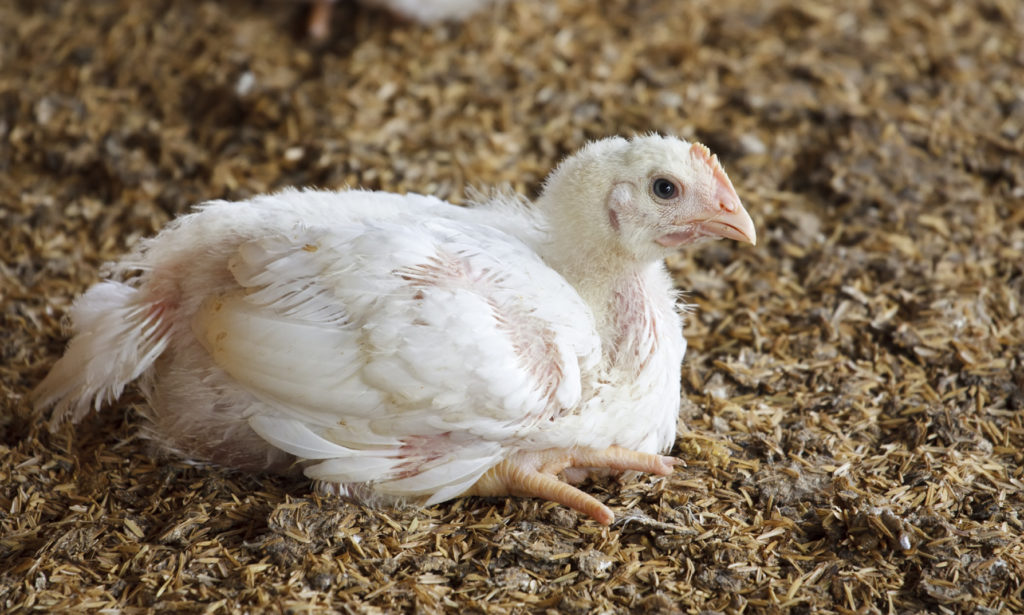El Partido para los Animales pide en Bruselas prohibición total del veneno fipronil
La Comisión Europea debe sacar de la agricultura Europea el veneno fepronil que se encontró en grandes cantidades en los huevos. Anja Hazekamp, diputada al Parlamento Europeo en nombre del Partido para los Animales, emitió una solicitud para ello en Bruselas durante un debate sobre la crisis fipronil.
Fipronil no esta permitido utilizarse en la cadena alimentaria, pero si está legalmente disponible. El veneno todavía ahora aun se permite para el uso en la agricultura. “Fipronil esta libremente en venta en Europa y así fácilmente puede ser abusado para fines equivocados. Teniendo como resultado los huevos envenenados en el supermercado y en nuestros platos. Una prohibición total es más segura para la salud humana y animal y mejor para nuestro medio ambiente “, dice Hazekamp.

Gallina de la industria avicola
Se violaron seriamente las reglas de la UE
El Partido para los Animales también señala que se ha actuado en forma irresponsable con el bienestar de los cientos de miles de gallinas tratadas con fipronil, que el mes pasado fueron matados en Los Países Bajos. Según Hazekamp los sacrificios fueron en violación de las normas de la UE para la proteccion de los animales y por lo tanto ilegal. “Estas gallinas no estaban enfermas y no formaron ningún riesgo para la salud pública. Aquí se ha causado dolor innecesario, sufrimiento y lesiones infligidos a las gallinas y esto es contraria a la legislación europea. Quiero saber cómo la Comisión Europea piensa prevenir estas prácticas en el futuro, “dijo Hazekamp.
El Partido para los Animales ve en la crisis fipronil una prueba más de que las reglas Europeas para el bienestar animal no son respetadas y que mayormente el control no se respeta. “Allí se ha mostrado una vez mas que nuestro sistema agrícola es insostenible, pero temo que la Comisión Europea todavía necesita muchos escándalos mas para llegar a la misma conclusión.” dijo Anja Hazekamp
Información a fondo
En julio, fue encontrado el veneno fipronil en los huevos en los Países bajos y Bélgica y luego resulto que también en otros países Europeos hubo entonces probado los huevos de otros países europeos, fueron infectados. También resulto que algunos terneros habían estado en contacto con un veneno similar, llamado amitraz. Muchos huevos y ovo productos fueron retirados de los supermercados porque resultaron ser un peligro para la salud pública. En respuesta a estos escándalos, el Partido para los Animales solicito a los representantes del Parlamento que estaban en periodo de vacaciones para que regresaran para un debate. El gobierno holandés ha creado ya una investigación sobre el escándalo de los huevos.
During a debate on the fipronil scandal, Party for the Animals MEP Anja Hazekamp has called on the European Commission in Brussels to ban the insecticide fipronil, found in vast quantities of eggs, completely from European agriculture.
In the EU, fipronil cannot be used on animals destined for human consumption, but it is legally available and authorised for use in arable farming. “Fipronil is freely available in Europe, and can therefore easily be used for inappropriate ends, leading to contaminated eggs ending up on supermarket shelves and our plates. A total ban will be safer for human and animal health and the environment,” said Hazekamp.

A chicken in the poultry industry
Crude violation of EU rules
In addition, the Party for the Animals points out that there has been insufficient regard for the welfare of the hundreds of thousands of laying hens treated with fipronil, which were slaughtered in the Netherlands last month. According to Hazekamp, these killings were in violation of EU rules on the protection of animals, and therefore illegal. “These chickens were neither ill nor a threat to public health. Pain, suffering and injury were unnecessarily inflicted on chickens, which is at odds with European legislation. I would like to know how the European Commission is planning to avoid such practices in the future.”
To the Party for the Animals, the fipronil scandal is further proof that European rules for animal welfare and food safety are not complied with, and that there is hardly any monitoring. According to Hazekamp, the scandal has once again demonstrated the unsustainability of the Dutch agricultural system, but she expects the European Commission to “need many more scandals before coming to the same conclusion”.
Background
In July of this year, eggs tested in Belgium and the Netherlands were found to contain levels of the toxic insecticide fipronil. Soon after, eggs in other European countries also turned out to be contaminated. In addition, it came to light that some calves had been in contact with a similar pesticide, called amitraz. Many eggs and egg products were removed from supermarket shelves because they presented a public health risk. Following these scandals, the Party for the Animals called for the Dutch Lower House to return early from Summer recess for a debate on the subject. The Dutch government has launched an enquiry into the egg scandal.